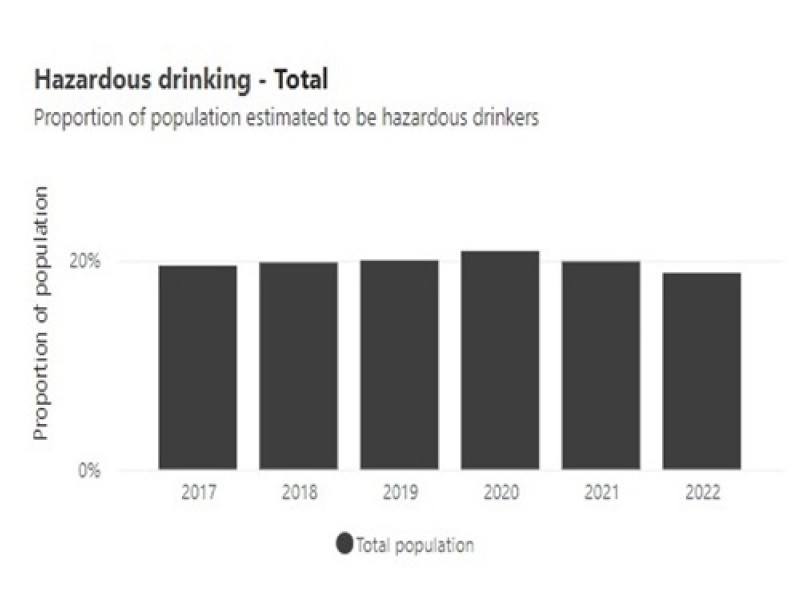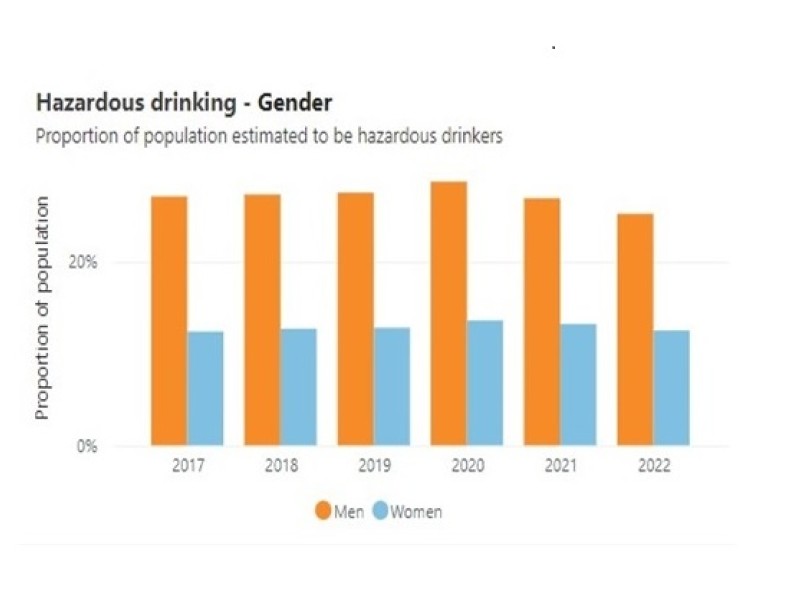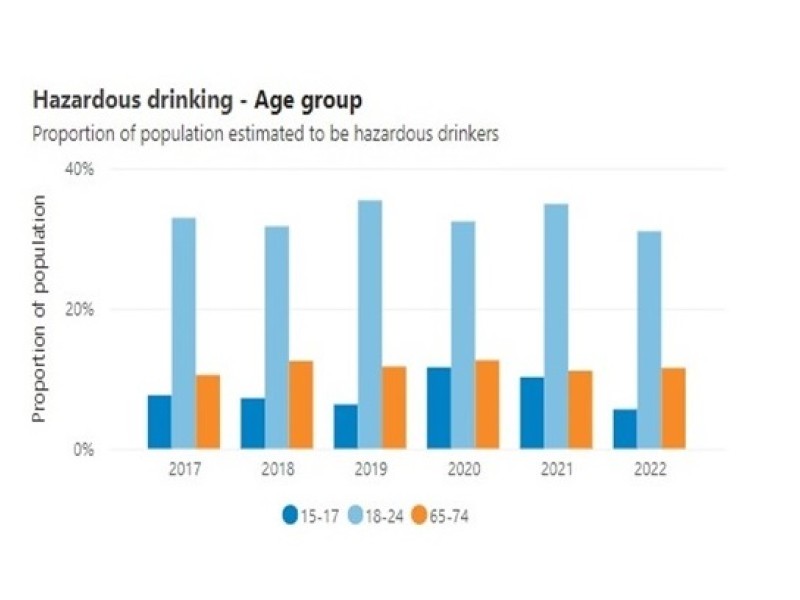*In order to protect the privacy and anonymity of those sharing their personal journeys of addiction and recovery, names in the story have been changed.
Behind Closed Doors: Living with an alcoholic
 Georgie Hanafin
Georgie Hanafin
Navigating life alongside an addict is an emotional journey filled with love, despair, and hope. This is one person's story of loving an alcoholic.
Trigger Warning: This article includes personal stories related to addiction and its impact on individuals and their families. The content discusses challenging experiences, emotional distress, and recovery journeys. Please proceed with caution, and if you find yourself in need of support, consider reaching out to a mental health professional or a helpline. Your well-being is important.
Throughout history Kiwis have engaged in the consumption of alcohol, with a staggering 93 percent having had at least one alcoholic beverage as per the NZ Health Survey 2020/21.
The survey by the Ministry of Health also reveals nearly 20 percent of adults engage in drinking patterns that may jeopardize their well-being.
The motivations behind drug and alcohol use are diverse, ranging from recreational purposes and spiritual exploration to performance enhancement, peer influence, and self-medication.
Notably, a majority of substance users, approximately four out of five New Zealand adults, report no enduring adverse effects, according to the Ministry of Health.
Nevertheless, for some, alcohol can lead to substantial harm.
The repercussions can manifest in various ways, encompassing physical injuries, diseases, social, financial, and legal complications. Moreover, the impact extends beyond the individual to affect their families, friends, and the broader community.
About 50,000 people in New Zealand seek help for alcohol and drug issues each year, but it's believed that around 150,000 kiwis struggle with addiction
Melanie and Bruce: A candid account of life, love, and resilience with an alcoholic partner
Melanie was thirty-eight and says her biological clock was ticking. Friends of hers had found love using online dating sites, so in 2011, Mel set herself up with a profile, and quickly matched with Bruce.
On paper, they were a perfect match. They both loved musicals and had roles in the same local theatre productions, albeit in different locations and at different times.
Mel says while the physical attraction wasn’t there, she was drawn to the "family man" image he portrayed online.
"He'd shared photos of him with his kids at a family event and he looked like someone who valued family. That was attractive to me."
After a short period of talking on the phone and texting, they decided to meet up.
Melanie says she’d been upfront about her dating preferences when it came to smokers. She'd recently kicked the habit herself, so had set clear boundaries regarding dating someone who smoked.
While she didn't have an issue with someone who enjoyed a social drink, Mel says she had come to realise that for her, alcohol and cigarettes were closely intertwined, so dating a heavy drinker was also out of the question.
Something she says Bruce understood and accepted.
Melanie explains their relationship picked up speed, and after just a few dates, they'd fallen into a routine.
“I’d go around to his tiny, two-bedroom flat and we’d eat chips, have a few drinks, and watch movies on his floor mattress in the lounge,” she laughed.
“He had a good job but was always broke which never made sense,” Mel mused. “His flat had next to no furniture. He ate off a metal folding camping table and had nothing to sit on. It should have been the first major red flag."
Despite the lack of physical attraction, and concerns about Bruce's finances and living situation, Melanie's strong desire for children and belief Bruce was still just a social drinker, made her see this as her last chance for the family she dreamed of.
A life on the edge
n 2013, Melanie says she and Bruce moved into their first home together, where both his financial and drinking issues became more apparent.
She says he was cagey about money, complaining about the child support he had to pay for the kids up North he rarely saw, and was constantly in trouble “for no reason” at work.
“He refused to take any accountability for the things happening in the office,” she says. “He’d complain about this person or that not doing their job properly, which in turn made him look incompetent and unable to do his job. He was constantly in and out of meetings with his superiors and would always want a drink after a shitty day.”
Mel says there were other troubling experiences, but she didn't know how to voice her concerns, like the missing cash from her wallet or his reluctance to involve her in financial conversations or share accounts.
His drinking had also increased, although she says he kept the extent of it secret.
Despite her reservations, she still badly wanted a family, so she focused on the positives.
“He loved being in the kitchen, which I did not,” she laughed. “I had really low self-esteem, and he was such a good cheerleader. I started art classes and was so down on myself for not immediately being good. He encouraged me to keep going and learning, and I did. And I got better the more I practiced.”
By the end of 2013, Melanie was pregnant with their first child, a daughter they’d name Molly, with baby Kate completing the family two years later.
During this time, Melanie says they barely toed the poverty line, living paycheck to paycheck and relying on any cash jobs Mel took on as a massage therapist.
“I couldn’t understand how we never had money for bills or groceries,” Mel recalls. “He’d gotten promotions at work, but we still relied on 0800 HUNGRY (a local food parcel charity) and were often being threatened with disconnection from the phone and power companies. We didn’t have joint accounts either because Bruce said it wasn’t needed.”
Melanie also speaks of a phone call she received from a friend who had stumbled across a Tinder profile connected to Bruce's Facebook account.
"I hit him up about it and he claimed someone else had set up an account using his name and photo."
She says he even went through the trouble of showing her how easy it was to set up a fake account.
"It was just another way he used my naïvety against me. I had no idea about tech stuff, and he was working in IT at the time, so I took him at his word," she says.
The hidden struggles
In 2017, Melanie and Bruce's landlord announced he was selling their flat.
She rallied her friends and family to help pack their belongings into boxes and move into the new place they’d found to rent on the other side of town.
It was then, Mel says, the true extent of her partner’s drinking problem became apparent.
“I was packing the garage up when I discovered dozens of cans of Diesel hidden everywhere. I filled a big, black rubbish bag with the cans I found in all the cupboards out there.”
She says she continued to pack the garage, while feeling sick to her stomach. “I kept finding cans hidden in the weirdest places. He’d even used the boot of the car we use to drive our kids around as a hiding place.”
Tears pool in Mel's eyes as she remembers the feelings of embarrassment and shame.
“How did I ignore it for so long?” she cries. “It was ridiculous. It was so obvious, but I was so naïve, and had no idea how to bring it up with him. So, I just didn’t.”
Life didn’t get any better at the new house, when Mel received a call from a friend who’d seen Bruce on the dating app Tinder.
“He always had an answer for everything and arguing with him was exhausting,” she remembers.
“Our arguments never ended with me fully accepting his answers, I just couldn’t stand to be in the conversation anymore. It just kept going round in circles.”
Mel says Bruce also began to make impulsive and reckless decisions, like quitting his high-paying job to drive for Uber and deciding on a whim he wanted to join the police force.
“I always felt so guilty because he was so supportive of my art and singing, but I couldn’t give him the same support when he’d come to me with these decisions he’d come to in his own head. I was at home with the kids and unable to work full-time and he’s talking about wanting to leave for 6 months to be a cop or join the cast of an out-of-town show with a three-month travel schedule. It just wasn’t possible, but he always made me feel awful that I didn’t believe in him.”
Impulsive decisions and manipulative tactics
The years progressed, as did Bruce’s drinking problem.
The pair began couples counselling and Melanie brought up her issues around his drinking and spending.
Mel says he continued to deny having a problem but agreed to giving her access to the family finances and to setting up a joint bank account.
During this time, Mel says patterns in Bruce’s behaviour began to emerge.
“I’d find his stash of cans or bottles, confront him about it, argue semantics until I was blue in the face, then go to bed with things unresolved.”
She said his behaviour after these confrontations was alarming.
“He’d realise how close I was to leaving him, so he’d concoct some insane emergency that took the heat off him and played on the fact that I cared about him.”
She stops and thinks for a moment before explaining further.
“I found alcohol hidden in the bathroom and the next day he thought he had bowel cancer and had a Dr appointment booked. When I wasn’t acting concerned enough, he made a big deal about how I didn’t love him. I’d relent and push my anger at him down. He’d swear he had everything under control, then a few months later, it’d just rinse and repeat with another ‘event’ I had to feel sorry for him for.”
Eventually, Mel had had enough and told Bruce she wanted to separate.
“He did not take it well. After the girls and I left, he got really drunk. He spent the night messaging me photos of alcohol and pill bottles, claiming he’d overdosed.”
Mel says she called his mum and an ambulance who took him to hospital for evaluation, where he was later discharged and sent home.
“It really messed me up. A good friend helped me sort out what was going on in my head and we went to Aviva for some advice.”
Mel spent the next seven months living in the family home, sharing custody of the girls 50/50 with Bruce, but she says her ex never gave her the chance to move on.
"He was constantly sharing pictures of him spending what looked like quality time with our girls, or sending messages about how well he was doing and begging me to give him another chance. In contrast to my home, where the girls were expressing extreme anger and hurt over the separation and I was struggling immensely with how their emotions were manifesting."
Mel says her confidence in her ability to raise her girls as a single mum along with Bruce's insistence he was in therapy and no longer drinking found her giving in to his begging.
Though, she says, nothing had changed and the patterns kept reappearing.
"He'd drink, I'd get mad and call him out, he'd suddenly have something happen to him that'd flip me from fuming mad to feeling sorry for him, we'd go to therapy, he'd stop for a couple of months...rinse and repeat," she said.
Receipts and breaking free
The final straw came in 2022, when Melanie asked Bruce to produce the receipt for the weekly grocery shop, something the couple had agreed to during one of their weekly counselling sessions.
Bruce had already lost his licence after an excess breath alcohol charge, which put an immediate stop to his work as a rideshare and food delivery driver, but Mel says his sneaking around continued.
"He was supposed to give me the receipt after every shop, but there was always an excuse. 'It blew away. The machine didn't give me one. Oh I must have misplaced it or accidentally thrown it away.'"
Mel begins to cry.
"It just got to the point where I just knew. I knew he was buying alcohol but I just couldn't be fucked arguing. I'd never win and it was exhausting. Honesty is one of my strongest values, and every time it was just a stab to my fucking heart."
She blows her nose and continues.
"I asked him where the receipt was this time and he told me he thought he'd thrown it in the bin. So I said to him, 'Oh I'll just get it out.'"
Mel says she reached for the rubbish bag, but Bruce snatched it away, taking it with him into the spare toilet at the back of the house.
"It was actually kind of funny," she laughs. "I could hear him rummaging around in the bag and knew exactly what he was doing. He was back there grunting and straining like he was using the toilet, and when he flushed, I knew the receipt was gone."
Eventually, she says, he comes back out into the room she's waiting in and offers her the bag to look through, loudly proclaiming his innocence the entire time.
"I went outside with it and literally removed it, piece by piece from the bag into the rubbish bin, until I'd gone through the whole bag."
The receipt was long gone, and Bruce was once again able to turn the narrative into one where he was the victim.
But Melanie had finally had enough.
"I left the girls with him and walked to a friends house for a coffee. When I got home, they were asleep, so I just went to bed. I woke up the next morning, didn't even speak to him, and went straight to Aviva to ask for help in leaving him once and for all."
Moving forward
One year down the track and Mel says moving on is hard.
"It's not that I want him back, coz I don't," she laughs. "But no one goes into this hoping to one day end up a single parent. I wanted so badly for it to work."
Melanie says she's still learning how Bruce's drinking has impacted herself and her girls.
"The sound of a drink can being opened makes my skin crawl and triggers my anxiety. I'm in the process of getting the girls counselling. They really struggle with the shared care arrangement and the huge difference in the way we parent."
Mel stops talking and begins to tear up once again.
“I’m exhausted. I’m exhausted from dealing with him daily. He’s incredibly passive aggressive and manipulative and he uses the girls as a tool to make me do what he wants. I’m still the one who picks them up and takes them to their extra-curriculars on his days because he refuses to. The girls come home dirty and complaining about things that go on at Bruce’s. It’s hard. It’s really hard.”
Twelve months on though and Mel says leaving was a decisions she’s forever glad she made.
“I’m slowly learning that I didn’t deserve that. I deserve good things, and I have good things. I love the home I’ve created. I love the space I share with my girls. I love the fact that in my house, I’m the one in charge of all the moving parts. We struggle daily. There's still a lot of confusion, and hurt, and anger, but I know we'll be ok."
Al-Anon and Alateen
In the complex and often challenging journey of living and loving someone struggling with alcoholism, the Al-Anon Family Groups emerge as a beacon of hope and support.
Established in 1951, Al-Anon is a global mutual aid organization that provides solace to those affected by someone else's alcoholism.
Described on it's website as a "worldwide fellowship," Al-Anon offers a comprehensive recovery program tailored for families and friends of alcoholics, completely separate from the alcoholic’s treatment or journey.
At the heart of Al-Anon's efforts is the belief that alcoholism is a family illness, and their primary goal is to aid families of alcoholics through the practice of the Twelve Steps.
Unlike intervention programs, Al-Anon operates through small group meetings where members are encouraged to focus on their own personal growth and healing rather than solely on the alcoholic.
Alateen, a vital part of Al-Anon, specializes in providing support to younger relatives and friends of alcoholics during their teenage years.
Al-Anon's commitment to addressing the emotional needs of friends and families is reflected in its literature, which explores common issues such as excessive care-taking and self-blame.
Various studies suggest that Al-Anon participation is associated with reduced personal blame, particularly among women.



State of the Nation 2022
Every year the New Zealand Drug Foundation releases the State of the Nation report in an effort to tell the overall story of drugs and alcohol use and abuse in Aotearoa.
In 2022, around 78.5% of people reported to have drank alcohol, a trend that according to NZ Drug Foundation, hasn't changed much in the last decade.
It says more men than women drink, and the biggest drinkers are those aged 18-24.
About 25.4% of adults who drank did so hazardously in 2020/21, impacting around 825,000 people.
Surprisingly, overall alcohol consumption didn't increase during the pandemic.
In the April 2020 lockdown, 19% of people said they drank more than usual, but 34% reportedly drank less.
